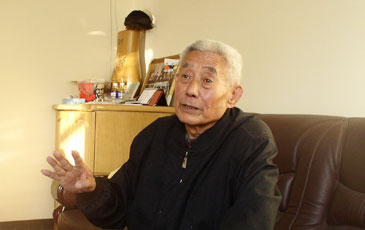|

CORDIAL INVITATION: Shi Changxiang, a 73-year-old resident of Zouping, says U.S. scholars have been welcomed there for three decades to investigate and observe life in rural China
(LAN XINZHEN)
Shi Changxiang, 73, often looks through his old photographs of the various U.S. scholars who have paid numerous research visits to Zouping County in east China's Shandong Province over the last three decades, observing and recording the way of life in the rural county. Some of the photos show local families and others are of Shi and the scholars.
When Zouping became the first place in rural China opened to U.S. scholars in the 1980s, Shi was in change of their local itinerary.
The program came about in 1979, when late Chinese leader Deng Xiaoping paid his first visit to the Untied States. Deng and the Americans reached a general agreement on exchanging students and scholars. It included a memorandum of understanding that the Committee on Scholarly Communication with China and the United States National Academy of Sciences would send scholars to rural areas in China every year. The scholars would stay there for some time to gain firsthand living and research experience. At the time, the Americans believed they could not have full knowledge of China without understanding its rural areas, where 80 percent of the population lived. The two sides proposed the selection of a place in the countryside for investigation and research.
The Chinese Government had planed to select a county in the coastal area as the spot for the U.S. scholars, Shi said. But since China had just embarked upon its reform and opening-up policies and people were still not open-minded, officials in many provinces declined the offer. It was not until October 1984 that Shandong Province accepted the invitation and suggested four counties from which U.S. scholars could choose.
In June 1985, Thomas Bernstein, a professor of School of Political Science of Columbia University, visited Zouping. In July and August 1986, the Americans sent Guy Salvatore Alitto and Gold, history professors from the University of Chicago, to Zouping for an overall inspection. That same year, the county set up an office of foreign affairs to receive scholars from the United States. Shi, then 51 years old, was appointed the director of the office.
The Zouping County Government selected nine villages for American scholars to observe and investigate, Shi said. Because of the poor living standards in the countryside at that time, the villages had no facilities to receive foreigners. The county government allocated special funds of 300,000 yuan ($43,860) to build a two-story building in Fengjia Village. But because the village had no drinkable water wells, the office of foreign affairs sent drinkable water to the village every day. The office also opened an international direct telephone line and set up the first fax machine in the county for the U.S. scholars to use.
Shi recalls that Bernstein, the first American scholar to visit Zouping, brought with him rolls of toilet paper, soap, mosquito repellent and medicine for colds and stomach ailments, because he thought Zouping was as underdeveloped as areas in rural Africa where people were poorly dressed and had little or no access to modern medication. But he found that the situation was not like what he imaged. After Bernstein returned to the United States, he wrote a report on Fengjia Village in Zouping, objectively describing the situation in the Chinese countryside.
Shi also recalled a visit by William Chang, a professor from University of Michigan, who came down with dysentery during his stay in Zouping in 1988. Members of the hosting team recommended that Chang be hospitalized, but he did not trust the county hospital and worried that he would be infected with other diseases at the hospital. He tossed in agony as he delayed medical treatment and relied on medicine he brought from the United States. But the staff at the country's foreign affairs office took him to the hospital and he recovered the same night. This caused Chang to see Chinese medical facilities in a new light, Shi said.
Locals always have warmly received American scholars when they have visited the county. Michael Oksenberg, a famous China hand, paid five visits to Zouping. He made a lot of friends in the county, from government officials to farmers, and freely chatted and drank with them. When he came to Zouping for the third time in 1991, he also brought his wife and daughter to visit his old friends.
In October 1993, Kimberley Falk, a doctoral candidate in anthropology from the University of Pittsburgh, lived in Beihe Village of Xidong Town for one and a half years, investigating local folk customs. She studied the family status and social relations of pregnant women in the countryside. She participated in various activities in the village, including weddings, funerals and various celebrations just like a regular resident. She learned about local folk customs and the local dialect. When Falk returned home in 1995, many villagers saw her off, most of whom were women.
Shi said the U.S. scholars also had brought great changes to Zouping. First, they had changed the residents' mindsets so that they became more open-minded. The scholars also offered their opinions and advice on the development of Zouping. For example, when Oksenberg paid his fourth visit to Zouping in June and July 1996, he visited 37 county government departments, talked to workers and farmers and acquired a large amount of firsthand information. Before taking off for home, he proposed many pertinent suggestions about garbage disposal and the protection of water resources. The county government adopted all his suggestions. |
